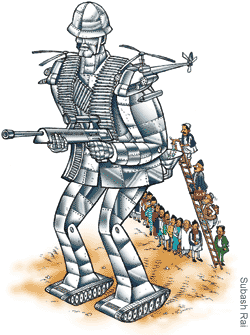 It is a classic Catch 22 situation: the Maoist war is sucking money away from development which is needed to address the root causes of the insurgency.
It is a classic Catch 22 situation: the Maoist war is sucking money away from development which is needed to address the root causes of the insurgency. For Finance Minister Ram Sharan Mahat, who was already finding it difficult to balance the budget, the task is near-impossible. How is he going to find enough money to pay the initial price tag of Rs 5 billion for the war effort while ensuring that there is enough cash for education, health and other development work?
There is no way he can do it without donor support. "We are looking at an immediate increase of Rs 4-5 billion on security spending," Mahat told us this week. "It could grow depending on how long we have to continue the operations." Mahat has already made one round of the donors, and initial indications are positive.
There is a consensus in the donor community that the government was negotiating in good faith with the Maoists, and it really had no choice but to unleash the army after the Dang attacks on 23 November.
"All donors feel the Maoists have brought this on themselves, and the time has come to go beyond moral support for the government and put our money where our mouth is," one Kathmandu-based diplomat told us.
To make the additional grants more palatable to donor governments, which have rules against supporting the military, Mahat plans to ask for development assistance to meet the shortfall in the budget caused by reallocation for security. "Budget substitution would just be fudging, but these are extraordinary circumstances, so it may do the trick," said another donor representative interviewed for this article. However, this time some donors say they would need guarantees that the development assistance goes directly into poverty alleviation of the least-developed areas of the country. Most donors have passed on Nepal's request to their headquarters, and are awaiting a response.
Most counter-insurgency experts in the Royal Nepal Army are confident they can squeeze the insurgents so they are either defeated, or forced to the negotiating table. But, they add, it is up to the government to show that it can deliver development. And the government's problem is that with the budget it has, it can't do both: fight the war and fight poverty at the same time.
Nepal is already spending nearly 10 percent of its Rs 100 billion annual budget on security. This may need to be doubled, in the next three months, depending on how the war goes. As it is, the war has already derailed spending plans and the government will be coming up with a new supplementary budget with re-allocations.


